KATHMANDU, Sept 26: Five decades ago, when twelve-year-old Tulsi Shrestha's parents said they could no longer afford to pay his school's tuition fees, he was unfazed. Instead, he decided to work as a construction worker to pay for his own education. Now, at the age of sixty eight, Tulsi says it was one of the best decisions he ever made.
Tulsi was one of eight children born to a family in Kathmandu whose occupation was farming. Tulsi's parents paid for his education from grade 1 to 5 at Shanti Bidhya Griha High School. But after grade 5, his parents could not afford to pay the fees. Tulsi worked from 5 am to 7 pm at construction sites during summer vacation to pay for his fees at the sixth and seventh grades. He worked during holidays and attended school for the rest of the year. “Schools in Kathmandu were much cheaper then. The fee for one month was Rs 7,” recalls Shrestha.
Academically, Tulsi was one of the top students of his class. “I would complete the maths problems before the teacher had even finished writing the question. I used to get 100 out of 100 in maths exams,” he said with a proud smile. But after more financial troubles brewed at home during his eighth grade, Tulsi left school and began to work during the daytime.
Even then, Tulsi held on to his desire to learn. “If I couldn't go to school during the day, I decided go at some other time.” He enrolled at a night school and when that didn't work out because it was difficult to commute at night, he started attending a morning school.
After some years of hardship, Tulsi finally sat for his SLC examinations.
After his board examinations, Tulsi worked as a driver for a salary of Rs 200 per month. “I remained a driver for thirty-two years. It was a job I could have gotten without my education so I often wondered why I had even bothered to go to school,” he says.
But as time passed, Tulsi's job prospects brightened and he was able to get a job at the Japanese Embassy for six years. He saved enough money to buy few rooms where he lived with his wife and three children. He also used the money to set up his own grocery shop worth Rs 250,000. “This small shop represents all my years of struggle. It is what I achieved in life,” he says proudly.
“As I had to struggle for my education, I did not let my children face the same problem,” Tulsi says in his closing remarks. His daughter is currently a housewife and his sons work in the Tamrakar House.
Quality education




































